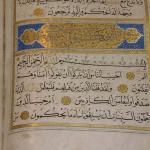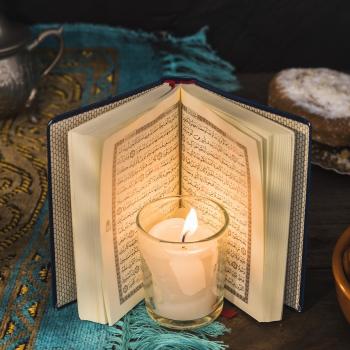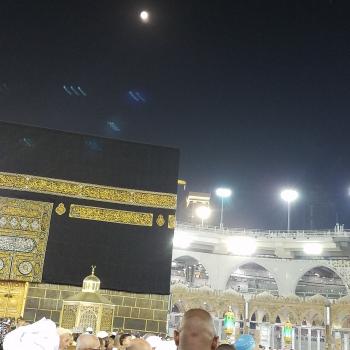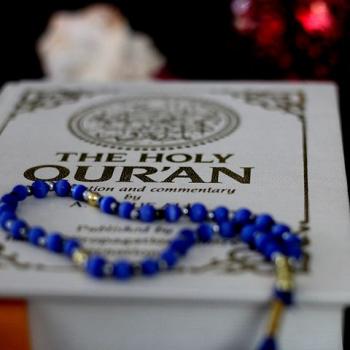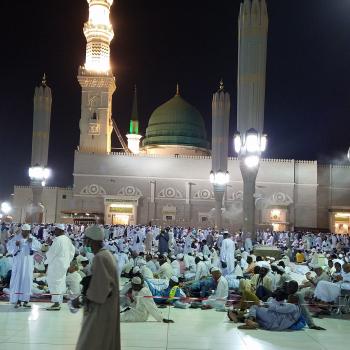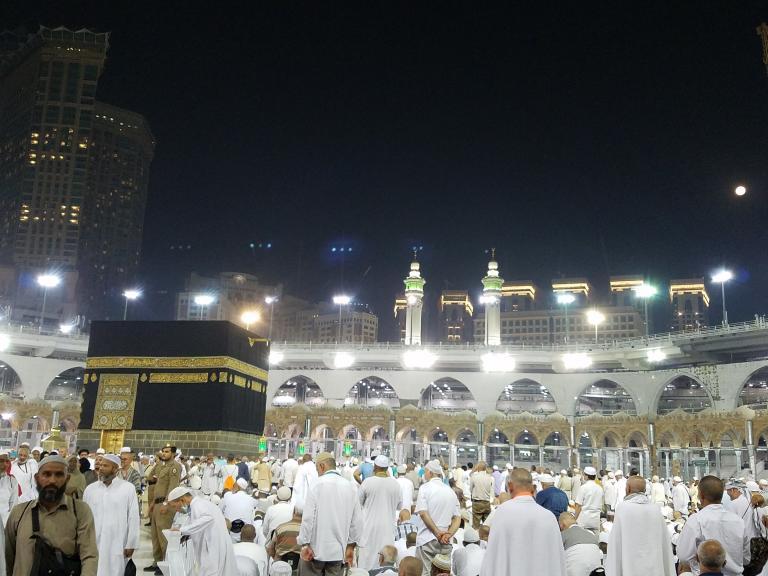 The Islamic Hajj season is upon us once again. Widely viewed as Muslim pilgrimage to Mecca (Ka’aba), a careful review of the Hebrew Scripture would reveal that Islamic Hajj may have more in common with khagg(or chagg) mentioned in Torah than we may realize.
The Islamic Hajj season is upon us once again. Widely viewed as Muslim pilgrimage to Mecca (Ka’aba), a careful review of the Hebrew Scripture would reveal that Islamic Hajj may have more in common with khagg(or chagg) mentioned in Torah than we may realize.
As millions of Muslims from around the world start to gather in the holy city of Mecca, I am once again reliving my own pilgrimage two years ago. I had posted a series of articles around this time last year, reliving my own incredible experience.
Hajj is one of the 5 pillars of Islam, mandatory for able Muslims. It involves a set of rituals over several days, including circumambulation, or tawaf, around Ka’aba, culminating in sacrificing a lamb or similar animal. Most, if not all, of the rites are to honor the memory of Abraham and his son Ishmael and his wife, Hagar. More than a mere set of rituals, Hajj is a life changing experience for many Muslims- a way for spiritual awakening and strengthening connection with God, along the way learning humility, and showing solidarity with others during a journey that is a source of immense inner peace like no other ritual.
Is Hajj meant for Muslims only?
Ka’aba was built by Prophet Abraham and his son Ishmael. Ka’aba was a source of pilgrimage, even before the life of Prophet Muhammad, except that centuries after it was built, it was filled with idols.
Islam is viewed as a religion of Abraham (Deen -e –Ibrahim), according to the teachings of the Qur’an. But there is no specific mention of Moses or other prophets before Prophet Muhammad performing Hajj in the manner Muslims do today.
A careful review of Hebrew Scripture reveals that Hajj was mentioned in Torah also.
Let’s review the Hajj literally.
Hajj in Arabic (حَجّ ) means heading to a place for the sake of visiting. It also translates to holiday or festival.
The Hebrew cognate of the word Hajj is khagg (also written as chagg), (חג in Hebrew alphabets). It is also important to keep in mind that the Hebrew phonetic “kh” (ח) is the equivalent of “ha” (ح) in Arabic, and the phonetic “g” (ג) is cognate to the Arabic “jeem” (ج). Therefore Hajj literally is the Arabic version of Khagg (and vice versa).
So where does the Torah talk about Khagg/Hajj?
והיה היום הזה לכם לזכרון וחגתם אתו חג ליהוה לדרתיכם חקת עולם תחגהו
Transliteration: wa-haya ha-yōm haza lakhem li-zikrōn wa-khagōtem otō khag li-Yehōwa li-dorotaychem khuqat `olam takhaguhū
English translation:
And this day shall be unto you for a memorial; and ye shall keep it a feast to the LORD throughout your generations; ye shall keep it a feast by an ordinance for ever. Exodus 12:14
Khag (חג) in this verse is translated as “feast”, and the words khagotem and takhaguhū are derived from the word khag.
One may, therefore re-translate this verse as follows:
And this day shall be unto you for a memorial; and ye shall keep it a Hajj to the LORD throughout your generations; ye shall keep it a Hajj by an ordinance forever.
Another verse using a derivative of khagg is the following:
And afterward Moses and Aaron went in, and told Pharaoh, Thus saith the LORD God of Israel, Let my people go , that they may hold a feast unto me in the wilderness Exodus 5:1
The highlighted word “feast” is yakhuggū , which is cognate to the Arabic “yuhajjū” and the verse may be retranslated as:
And afterward Moses and Aaron went in, and told Pharaoh, Thus saith the LORD God of Israel, Let my people go, that they may hold a Hajj unto me in the wilderness.
The Qur’an does confirm the prior revelations in many places , such as:
And this is a Book which We have sent down, bringing blessings, and confirming (the revelations) which came before it: that thou mayest warn the mother of cities and all around her. Those who believe in the Hereafter believe in this (Book), and they are constant in guarding their prayers. The Qur’an 6:92
This Qur’an could not have been authored by any other than God, as it rectifies what came before it and elucidates what was in the previous scriptures. Let there be no doubt that this is, indeed, from the Lord of all Worlds. The Qur’an 10:37
Modern use of Chagg by Jews
Many Jews use Chagg as a greeting. For example Chagg Sameach, whereby Sameach means “happy” and chagg is for “holiday”
Sometimes the holiday name is inserted in the middle; e.g. “chag Chanukah sameach”.
Hajj for Jews as per Rabbi Allen Maller
Rabbi Maller is a retired Reform Rabbi from Culver City, California, and has frequently highlighted similarities between Jewish and Islamic traditions, including Hajj. I am quoting passages from some of his relevant articles below.
Modern Jews can see in the annual Muslim Hajj, some of the wonderful spiritual uplift that occurs when large numbers of people from all over the world travel to one holy place and join together in a traditional religious ceremony. Muslims in turn, can see some similarities in the ancient Jewish practice of Hajj ceremonies.
Very few Jews realize that for more than 1.000 years, while Jerusalem’s First and Second Temple–Bait ul Muqaddas/Beit HaMiqdash stood, the Jewish festival of Hag Sukkot was celebrated as a Hajj, a pilgrimage festival. In Biblical times the Hebrew word Hag was pronounced Hajj. In the centuries after the Jerusalem Temple was destroyed; pilgrimage ceased. Today the great majority of Jews outside the Land of Israel live in Protestant countries where pilgrimage plays little or no role in religious life.
The Prophet Zechariah envisions a future time when God helps humans to establish worldwide peace. Then all the nations in the world then may travel to Makka or Jerusalem to worship God.
During Hajj Sukkot, a future Jerusalem will welcome both Jews and non-Jews, even including those who were previously Israel’s enemies: “Then the survivors from all the nations that have attacked Jerusalem, will go up year after year to worship the King, the Lord Almighty, and to celebrate Hajj Sukkot.” (Zechariah 14:16)
Just as the Ka’ba has always welcomed all Muslims who answer the call: “Call upon the people for Hajj. They will come to you on their bare feet, or riding any weak camel, and they come to you from every far desert. (Qur’an 22:27).[1]
In a similarly worded article in Times of Israel, he adds:
When educated Jews learn about the wonderful festivities of the Muslim Hajj, with its spiritual uplift that occurs when millions of people from all over the world travel to one holy place and join together in a traditional religious ceremony: they realize just how much we Jews have lost.
In the same article, he goes on to draw the parallel between the Qur’an and the Torah:
Both the Holy Qur’an and the Holy Bible stress the religious importance of an annual pilgrimage (Hajj in Arabic, Hag in Hebrew) to a sacred location. In Biblical times the Hebrew word Hag was pronounced Haj.
The Qur’an states: “So keep the three Haj (Pilgrimage) days and seven fasts when you return.” (2:196) and the Torah states: Three times a year all your men are to appear before the God of Israel. (Exodus 34:23)
The Torah also declares, “Celebrate Haj Sukkot for seven days after you have harvested the (fall) produce of your threshing floor and your winepress. Be joyful at your festival—you, your sons and daughters, your male and female servants, Levites, foreigners, orphans and the widows who live in your towns. For seven days celebrate the (pilgrimage) festival to the Lord your God… Three times a year all your men must appear before the Lord your God at the place He will choose: at the (spring) Haj of Matzot, the Haj of Weeks (seven weeks later), and the (fall) Haj of Sukkot. (Deuteronomy 16:13-16)
The Haj of Sukkot was chosen as the best time to dedicate the First Temple in Jerusalem. (1Kings 8; 2). Haj Sukkot was so important during the centuries when Solomon’s Temple stood that the holy day week of Sukkot was often called simply “the Haj” (1 Kings 8:3; 8:65; 12:62; 2 Chronicles 5:3; 7:8).
To be clear, neither Rabbi Maller, nor I, are suggesting that Moses and Aron performed Hajj to Mecca in a manner Muslims perform Hajj today. But the concepts and the connection between the Hajj mentioned in the Qur’an and Khagg in Torah are intriguing, to say the least. Whether the current Islamic Hajj is a lost/forgotten Khagg for the Jews, or a pilgrimage that was amended for the followers of Prophet Muhammad, Hajj and Khagg are reminders of some of the common spiritual roots to be cherished by Muslims and Jews.
And as Rabbi Maller concludes with the following prayer:
But it is still possible to hope that in this generation; Christian, Jewish and Muslim pilgrims will come together in peace and brotherhood to Jerusalem on Haj Sukkot as foretold in a vision of Prophet Zachariah: “In that (future) day all the survivors of the nations who came against Jerusalem will go there from year to year to worship the King, the LORD of Hosts and to observe Haj Sukkot -the (pilgrimage) Festival of Sukkot. (Zachariah 14:16)
Please God, may it happen soon.
Whether that gathering happens in Mecca on Hajj, or Jerusalem on Hajj Sukkot, I say Ameen to a day when Jews, Christians and Muslims can perform the holy pilgrimage together, humbling and submitting themselves to the same One True God.
[1] https://www.eurasiareview.com/27082017-hajj-for-muslims-and-jews-oped/
PS: Portions of this article were adapted from an article by shibli Zaman on Virtual Mosque. http://www.virtualmosque.com/personaldvlpt/worship-personaldvlpt/hajj/hajj-in-the-bible/

